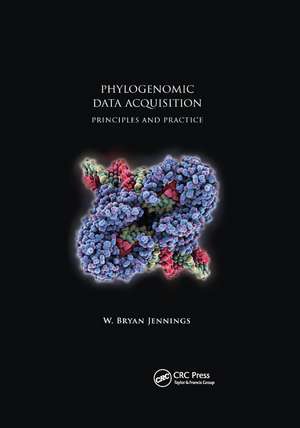Phylogenomic Data Acquisition: Principles and Practice
Autor W. Bryan Jenningsen Limba Engleză Paperback – 12 dec 2019
Preț: 352.89 lei
Preț vechi: 454.58 lei
-22% Nou
Puncte Express: 529
Preț estimativ în valută:
67.54€ • 69.61$ • 57.02£
67.54€ • 69.61$ • 57.02£
Carte tipărită la comandă
Livrare economică 03-17 martie
Preluare comenzi: 021 569.72.76
Specificații
ISBN-13: 9780367869809
ISBN-10: 0367869802
Pagini: 244
Dimensiuni: 178 x 254 mm
Greutate: 0.45 kg
Ediția:1
Editura: CRC Press
Colecția CRC Press
ISBN-10: 0367869802
Pagini: 244
Dimensiuni: 178 x 254 mm
Greutate: 0.45 kg
Ediția:1
Editura: CRC Press
Colecția CRC Press
Public țintă
Professional ReferenceCuprins
Introduction. PHYLOGENOMIC DATA CHARACTERISTICS AND ACQUISITION. Genomes, Molecular Evolution, and Molecular Markers. DNA Extraction. PCR Theory and Methodology. Loci Acquisition. Sanger and Next Generation DNA Sequencing. UNDERSTANDING AND MAKING GENE TREES: THE UNITS OF PHYLOGENOMIC ANALYSIS. Gene Tree Inference. Advanced Gene Tree Inference. PHYLOGENOMIC ANALYSIS: USING GENE TREES TO ANSWER EVOLUTIONARY QUESTIONS. Gene and Genome Evolution. Primer of Coalescent Theory. Species Tree Inference. Phylogeography I. Phylogeography II. DNA Barcoding and Forensics. Future Prospects. References. Glossary. Answers to End-of-chapter Questions.
Notă biografică
W. Bryan Jennings is professor and coordinator for the Molecular Laboratory of Biodiversity Research at Universidade Federal do Rio de Janeiro.
Recenzii
"There is definitely a need for this book written in the language of the phylogeneticist. The general organization of the book is good. This book addresses a broad range of topics in a way that makes them comprehensible to people who are not experts in bioinformatics and will be extremely influential. Jennings has been in on the ground floor of the multilocus coalescent revolution in phylogenetics."
Jim McGuire, University of California Berkeley"Genome sequencing technologies and data collection techniques are changing rapidly, and this book is a great resource for getting up to speed in this exciting field. Jennings outlines the essential data collection strategies that all students entering the field of molecular systematics need to know. "
Adam Leaché, University of Washington, Seattle"This new book by evolutionary biologist Bryan Jennings brings together a wealth of useful information allowing researchers to move from start to finish in the rapidly changing field of phylogenomics. It details step-by-step protocols and provides masterful summaries of best practices for the modern phylogeneticist. Graduate students, postdoctoral fellows and principal investigators will find this book extremely useful. Jennings cuts through the jungle of sometimes conflicting information and provides cogent reviews of important topics and guidelines for avoiding common pitfalls."
Scott Edwards, Harvard University
Descriere
The genomes of many individuals can be assembled and analyzed using convenient and widely available computer programs running on every desktop or laptop computer. This rapid development has resulted in an entirely new sub-discipline of evolutionary biology called "phylogenomics," the integration of phylogenetic sequencing data and analyses imple
